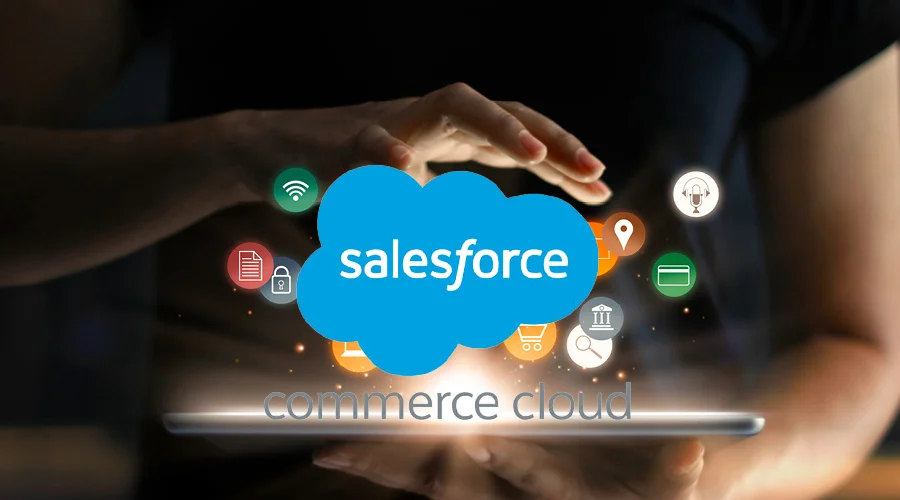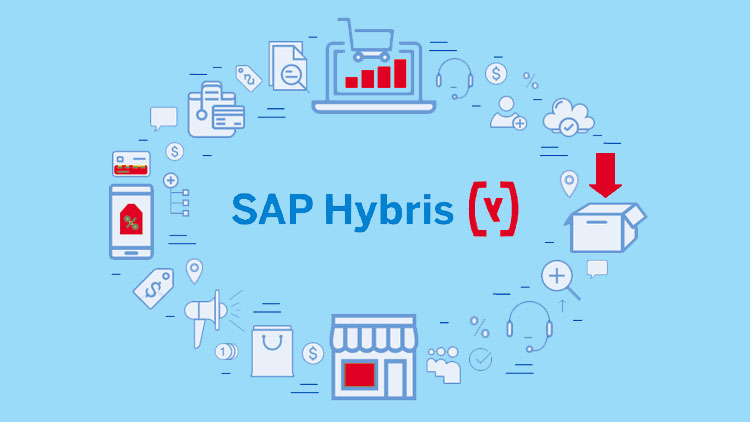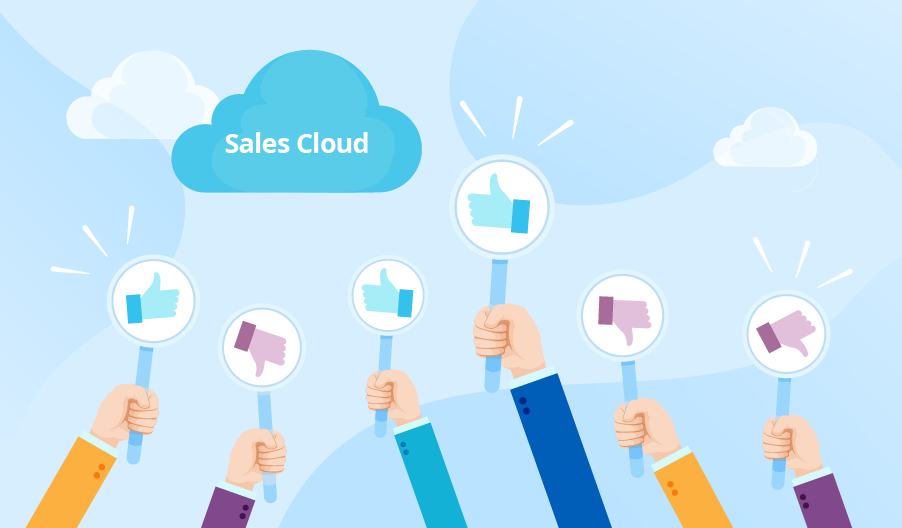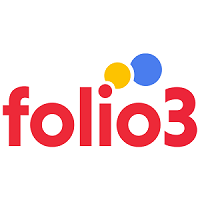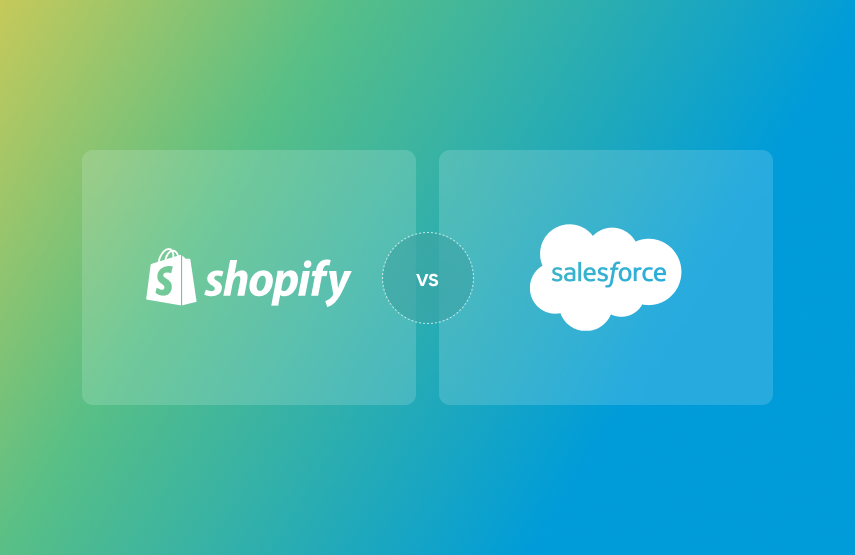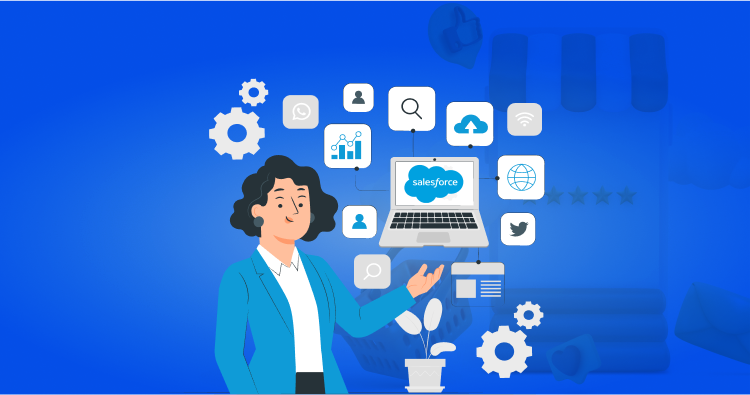Demandware was the previous name Salesforce Commerce Cloud. It is a software-as-a-service (SaaS), cloud-based eCommerce system. However, SAP Hybris, commonly known as SAP Commerce Cloud, is designed for larger organizations. It works well in a setting where SAP is prevalent.
Along with other cloud-based services on goods like Sales, Marketing, Service Cloud, etc., Salesforce Commerce Cloud offers a more customized online buying experience.
Questions about scaling commerce? Read this article Salesforce eCommerce integration and What is Salesforce Commerce Cloud Pricing? The Ultimate guide to having a better understanding of the topic.
We will discuss a comparison of the aforementioned items, a Salesforce commerce cloud services Vs SAP Hybris debate, based on various characteristics in this post. Both feature various business instances for the stakeholders and strong functionalities.
The sharp contrast between the two helps you decide that SFCC is a much better choice over SAP without gaslighting the edges and strengths of SAP Hybris.
We will start the Salesforce Commerce Cloud Vs SAP Hybris debate with an in-depth overview of both SFCC and Sap hybris.
You might also want to read: Salesforce Merchandising
An In-Depth Overview of SFCC
Salesforce’s commerce suite is strengthened by the platform’s excellent performance and omnichannel support for B2C. The platform does an excellent job of creating business rules for unique marketing and promotional activities.
Users can access CRM customer data in conjunction with Salesforce B2C Commerce to obtain a detailed history of every customer interaction. Retailers praise the platform’s prospecting and analytics as well as the way that the information is laid forth.
Read about top Salesforce trends that will help businesses keep up with all the latest Salesforce future developments
-
Pros Of SFCC
- It includes an excellent sales-driven engine that tracks the lead lifecycle and offers chances to automate campaigns.
- With Einstein, predictability, reporting, and analytics. It offers robust AI and machine learning systems that take into account user behavior and offer the level of data that is needed.
- Businesses get a huge ratio of sales revenue as it was first created to assist major players and relieve them of their technical burdens.
-
Cons Of SFCC
- Salesforce B2B Commerce Integration opportunities excel, whereas SAP Hybris is an obvious choice.
- A weak sense of community and outsourcing Demandware developers must, for the most part, draw support from their experience.
- For small and mid-sized firms, it is incredibly costly.
Questions? Ask about Salesforce Commerce Cloud implementation, or anything else. Also, Read this Guide What Is Salesforce Commerce Cloud
An In-Depth Overview of SAP Hybris
Hybris is ideal for a speedy start with an enterprise e-Commerce project and fits well for large development organizations.
The most common client journeys may be covered by SAP Hybris, liberating you from doing anything but the most basic changes.
Read this article to know which one is superior: Salesforce Commerce Cloud Vs Salesforce Marketing Cloud
If we delve further into the range of solutions that Hybris can empower, we can claim that, based on our experience with this technology, it is ideal for midsize and large retail organizations in addition to small firms.
-
Pros Of SAP Hybris
- Establishing an enterprise-level eCommerce platform quickly. You can start trading online after just one working day. Connecting extra tools is the only thing remaining to do.
- OOTB features for B2B2C selling are numerous and diverse. Hybris was initially intended to be a B2B platform, even though it was a huge success for B2C.
- Scalability for unrestricted growth
Compare the similarities and differences between Salesforce Commerce Cloud vs Demandware
-
Cons Of SAP Hybris
- SAP Hybris makes it difficult to acquire customized help. The problem will be resolved if you can locate a dependable software provider.
- You could think there aren’t enough resources, but that’s just how it seems at first. You’ll find a haven of devoted developers if you look into Eastern Europe.
- A proprietary product can only be used with proper documentation and community support.
You might also want to read: Benefits of using eCommerce Site Migration
Salesforce Commerce Cloud Vs SAP Hybris – With Table Comparison
Understanding the comparison with a comprehensive view is necessary to understand the Salesforce Commerce Cloud Vs SAP Hybris debate
| Features | SFCC | SAP Hybris |
| Origination | United States | Germany |
|
Business Aim |
||
| Aims B2B | Claimed 3 | Claims 10 |
| Aims B2C | Available | Available |
| Customer Types | Small, medium, and large business | Large enterprises and medium businesses only |
|
Technical Performance |
||
| Programming language | Java | Java |
| Smartphone Version | Available | Available |
| Mobile Applications | Available | Available |
| SaaS | only | Available/Not Available |
| Web Services Or APIs | Available | Available |
| Deployment Ease | 9 | 7 |
| Settings And Customization Ease | 7 | 9 |
| Technological Readiness | 9 | 9 |
| Frontend Performance | Minimum influence | Substantial influence |
| Backend Performance | Minimum influence | Substantial influence |
|
Integrations |
||
| Default | Not Available info | Data Hub, ERP, CSV, ImpEx, SAP CRM |
| Payment Gateway Systems | 8 | 7 |
| Tax Systems | 8 | 9 |
| Shipping Systems | 8 | 9 |
|
Pricing |
||
| Pricing Plans | Quote-based | Quote-based |
| The Community Version | Not Available | Not Available |
| The Enterprise Edition | Available | Available |
|
Features |
||
| Functionality-Rich | 7 | 8 (9 with market addons) |
| Order Management System | 7 | 8 |
| Extensions and Add-ons | Available | Available |
| Sales-Driven | 8 | 8 |
| Consumer Segmentation | 9 | 8 |
| SEO friendly | 8 | 8 |
| Flexibility and Extendibility | 6 | 9 |
| Free Theme Designs | Available | Not Available |
| Extensions Library | Available | Available |
| Easy Content Managers | 5 | 7 |
| Third-party Compatibility | Available | Available |
| Technical Support System | Good | Depends on a vendor |
| Data Import/Export | OOTB | OOTB |
| CMS | 5 | 9 |
| Customization | 7 | 9 |
| Effective Cache | Exists | Exists |
| Friendly UI | 5 | 8 |
| Without dev Changes | 6 | 7 |
| Third-party integrations | 7 | 7 |
| Image Management | 5 | 7 |
| Multisite Management | 9 | 7 |
| Omnichannel | 6 | 10 |
| Languages | English, French, Spanish, Brazilian Portuguese | English, China, Germany, India, Japan, Spain, France, Russia |
|
Support |
||
| Community support | 3 | 7 |
| Version updates | Automatic done | Manually done |
| Skilled resources | 5 | 7 |
Why is Salesforce Commerce Cloud better than SAP?
You might also want to read: Salesforce Commerce Cloud Benefits
Every eCommerce platform has advantages and disadvantages, and SAP Commerce Cloud and Salesforce Commerce Cloud Consultant are no exception. SFCC is superior to SAP Hybris Commerce in terms of AI and mobile responsiveness.
Sales, Service, and Marketing are all included in Salesforce, a CRM solution. The system is cloud-based. Apex is used to program Salesforce. Any new apps for salesforce are created in apex.
Explore the complete Salesforce 360
Salesforce is superior to SAP just in terms of customer relationship management. The revenue share it has over SAP’s CRM and C4C is larger. It dominates the CRM market.
So as per the objectives of your business, internal resources, current infrastructure, and maturity level are just a few of the many variables that influence the “best” eCommerce platform which should be SFCC. This choice of platform will have long-term effects on your company.
Read: How to Boost Performance Salesforce Commerce Cloud
Which Platform Should You Use For Your eCommerce Store?
Read about How To Go Headless With Salesforce Headless Commerce
This succinct overview should have made it clear that both systems have advantages and disadvantages. Regardless of the platform, you are choosing for your eCommerce project—SAP Hybris or Salesforce Commerce Cloud Development from the Salesforce Commerce Cloud Vs SAP Hybris—you should assess what you already have and your long-term goals.
If you wish to switch from your out-of-date platform to a B2B-adapted one, Hybris is the one with a wide range of scalable merchandising solutions. Or, if you are a tenacious achiever who has pushed the boundaries of your industry, using the Salesforce system is just what you need.
Everything You Need To Know About Salesforce For Small Business
Final Words
As a conclusive thought, we have decided to leave you with a final note on Salesforce Commerce Cloud Vs SAP Hybris.
When compared to the SAP offering, Salesforce Commerce Cloud provides a fantastic, user-friendly admin interface for both new and experienced users.
But with a Product Content Management system and a seamless, customized back-office UI, SAP Commerce Cloud has all of its data in one place (PCM).
For further queries on Salesforce Commerce Cloud vs SAP Hybris from Folio3 reach out to our team and get growing started with your Business today.
Or if you need any help regarding any other eCommerce platforms, we would be delighted to help you out.
FAQs:
What is the price for the eCommerce platform?
The cost of an eCommerce website is simply the total of all the costs associated with development, hosting, and the upfront expenses incurred to launch the website.
Websites with 100–1000 products typically start at $3,500 and can cost up to $60,000. This includes all production-related expenses, such as those for designing, development, and other related costs.
The cost of websites with 100–1000 products, on the other hand, ranges from $12,000 to $30,000.
What is the difference between on-premise and cloud-based eCommerce systems?
The primary distinction between cloud-based software and on-premises software is whether it is installed locally on the company’s servers or is hosted on the vendor’s server. There are differences in software licensing, security, cost upgrades, and extra services.
On-premise software offers greater flexibility, dependability, and security as compared to cloud software. On the other side, hosted cloud software relieves the burden of managing and maintaining systems, allowing you to concentrate your time, energy, and resources.
Which platform is better for eCommerce enterprises?
The most effective eCommerce platform overall is BigCommerce web design company. It’s perfect for bigger retail firms because of its powerful product search engine.
It’s also a wise decision for those who wish to launch an online store or who already run a brick-and-mortar business but want to include internet orders in their operations. Any specialty or industry can succeed thanks to the tools that are available.
Why are enterprises moving to the cloud?
Businesses can decrease or do away with servers and other infrastructure by shifting apps to the cloud, and they can delegate the majority of activities to the cloud service.
They receive speedier application deployment, which is crucial for most businesses as gaining a competitive advantage in the market.
While implementing older programs often necessitates protracted hardware acquisition and staging cycles, cloud applications may be swiftly reviewed, deployed, and scaled – frequently in a relatively short time.
